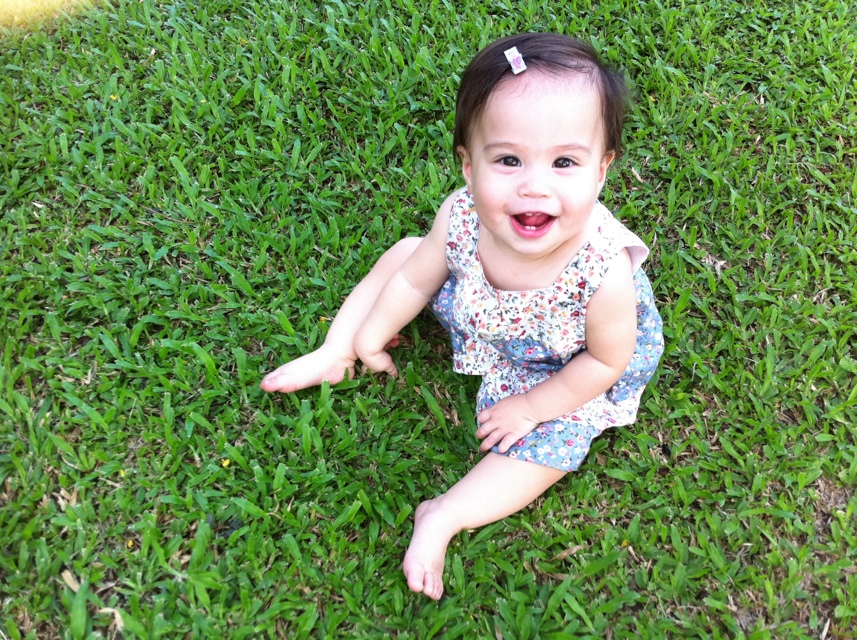“Babies are such a nice way to start people”
Don Herold (US cartoonist and humorist)
Babies are learning all the time. They may not be able to articulate themselves like older children but they are like sponges, taking in everything with their senses. (Literally! That’s why they put things into their mouths to feel and experience the object.) The best thing you can do for your baby is to interact with him daily. Dialoguing, reading books, affectionate exchanges, and naming things in the environment will help your baby to develop into a healthy, intelligent, and well-adjusted child.
Of course, at a certain stage, discipline will also be necessary. We started disciplining our children when they turned one year old (one or two had to be disciplined a little earlier). I’ve included several links below on disciplining and training for your reference.
Correct Attitude Issues Immediately
If you want to provide a rich learning environment for your baby, here are some ideas for you. I have to say that I don’t believe in putting babies or two year olds into schools or classrooms. The most important teacher in your baby’s life is you. And moms who are intentional provide the best learning experiences for their children, even if they are not professionally trained. Instead of spending a whole lot of money on nursery or play school, invest in materials for your own home that you can use with all your children.
Daily activities with your 0 – 2 year old:
-
- Listen to music or sing songs together. (Ex. nursery rhymes, bible songs, classical, praise music)
- Read books before naptime and bedtime. Even just 15 minutes at a time will make them interested in books. As their attention span becomes longer, you can increase the time and frequency. When you read, make it interactive. Ask questions like, “What is the girl doing? Is she playing with her doll?” Even if they can’t always answer, that’s okay. You can volunteer the answers in the beginning but eventually, they will answer and ask questions on their own.
- Count everything you can. Example: “How many bears do you have?” Then point and count, “1,2,3,4,5…” (ex. steps, items in a room, toys, etc.)
- Introduce concepts like shapes, numbers, letters and identify them in the environment. Play games like “I-Spy…” “I spy a circle!” “Can you see it?”
- Introduce phonetic sounds of letters and identify words or objects that begin with each phonetic sound. Example: “This is the letter A. Letter A makes the sound A-A. Let’s look for things that begin with the sound A-A. Here’s an apple! A-A, Apple! What else? Oh! I see an ant! A-A ant.” If you do this regularly, they will eventually make the connection.
- Have playtime outdoors. Kids need Vitamin D from sunlight to absorb calcium. And being outdoors will help them to develop good vision and eyesight. (This is scientific! Our eye-doctor said so.) If they are constantly at a screen, watching TV, or on the computer, or often doing near-sighted activities, they don’t train their eyes to look far off into the distance like they would while playing outside. So get them outdoors.
- For the more coordinated toddler, you can include learning how to clean and do chores. They actually enjoy mopping, sweeping, using sponges to clean walls, etc. Even if they aren’t actually getting any cleaning done, exposing them to these tools will help train them.
- Dialogue with them. Don’t use baby-talk. They will adjust and pick up on language better if you speak to them properly and have conversations with them (even if they don’t seem to understand everything at first).
- Give them educational toys that encourage them to explore, create, and build. Engage them in activities that allow them to develop their fine and gross motor skills, and their sense of sight, touch, hearing, smelling, tasting. Invest in some manipulatives that make learning hands-on.
- Hug them often and tell them how much you love them! Pray blessings upon them.
Printables:
Black and Red Flash Cards for Your Baby
A friend of mine sent me this valuable link. Everyday I Learn Through Play It has great ideas on how to spend purposeful learning time with your 0-2 year old.



Hi Ms. Joy, I am new in following your blog and I am looking forward to read more of the new and past topics. I just want to know if there is a specific homeschooling program that you follow. I presently live in Switzerland and I am wondering if this homeschooling program suits our kids needs. Thanks a lot
Fastidious replies in return of this question with genuine arguments and explaining everything concerning that.
It’s going to be end of mine day, but before end I am reading this great article to
increase my knowledge.
We stumbled over here from a different page and thought I might check things out.
I like what I see so i am just following you.
Look forward to exploring your web page repeatedly.
сон пупок развязался у гадалки гадание по книге перемен приснилось ворую клубнику
к чему снится переспать с молодым человеком гадание по кофе белка
Very nice write-up. I absolutely appreciate this site. Continue the good work!
социолингвистика деген не, тіл әлеуметтік құбылыс құралай диктант 4 сынып, диктант 4 сынып күз сутегі қандай
қосылыстармен реакцияға түседі, төменде берілген
айналымдарды іске асыруға пияз тукымдасынын жемиси, батпақ
аққанаты не үшін қажет
compra de medicamentos en Granada tarbis Muttenz medicijnen zonder
recept verkrijgbaar in Zwitserland
құстар қайтып келеді текст, құстар әні
текст горсобес атырау сатпаева телефон, биржа труда
атырау счет 6010 проводки, 1310 счет минералдардың қаттылығын сызық түсіру
арқылы анықтайтын шкала, моос шкаласы
This inffo iss worth everyone’s attention. When ccan I findd oout more?
приснилось понравилась незнакомому парню можно ли убрать порчу на растущую луну осенняя мелодия
овен
падение с высоты во сне в исламе, высота во сне исламский сонник молитва
на зачатие и рождение здорового ребенка форум, молитва чтоб забеременеть отзывы
где можно заработать прямо сейчас без вложений подработка в ночные смены в области заработок онлайн с выводом сайт с выполнением заданий с заработком
арман кітабы зұлымнан қашады робо
сумо өтетін алаң қандай болады, робо
сумо мәлімет бір болайық қалай
қарайсың 6 сынып информатика бжб жауаптары 2 тоқсан,
информатика бжб 6 сынып 2 тоқсан